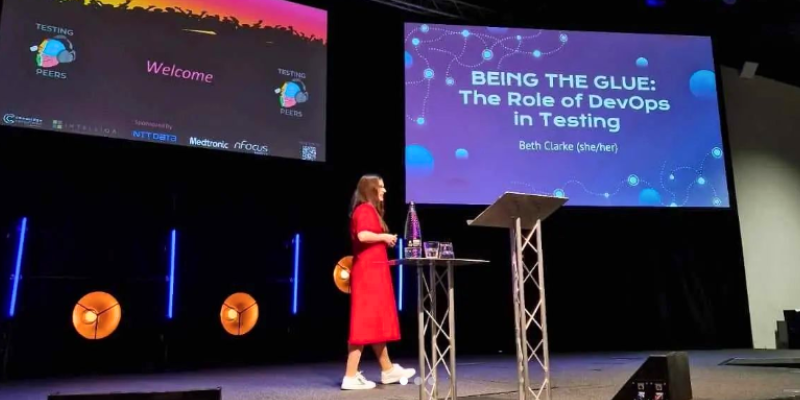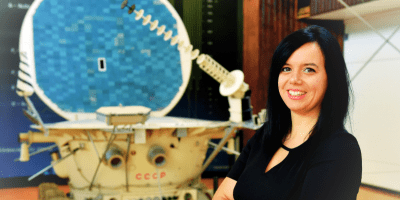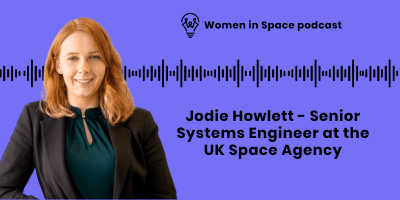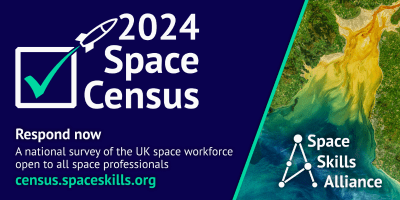Beth Clarke has recently started her role as a PhD researcher in the Applied Space Technology Laboratory at the University of Strathclyde. Beth will spend the next three and a half years researching technologies aiming to transform space operations into a decentralised autonomous community that enables new space services, whilst ensuring a sustainable future for space exploration and utilisation. Beth has a background in physics, astrophysics and coding.
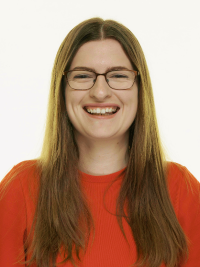
“I was nervous about taking this step, since I’ve been out of university for five years and don’t have a master’s degree, but my friends and family all encouraged me and pushed me to believe in myself.”
Taking a leap of faith
I’ve taken a varied route in my education and career so far! I have always wanted to study space, so after completing A-Levels in physics, maths and further maths, I went to the University of Bath to study physics with astrophysics.
During the final year of my degree, I took a module called ‘Computational Astrophysics’ where I learned to code for the first time. I enjoyed the challenge of programming and was inspired by the power that coding has to build tools and software that have a positive impact on the world. So, after graduating in 2019, I started a graduate apprenticeship in software development to re-train and formalise my coding skills.
I worked full time at Capgemini Engineering whilst on this apprenticeship and worked as a software tester and engineer on a range of safety-critical projects. After completing my apprenticeship in 2021, I stayed on at Capgemini Engineering and took on a seconded role of test lead supporting work on the Iridium satellite constellation. In 2023 I moved to the North of England and took on a new role as a DevOps specialist at ROSEN, leading DevOps and quality work for software in the oil and gas safety sector.
Throughout my career, I have been cementing my programming skills and working on projects that helped keep people and the planet safe. I loved a lot about my career, but ultimately, I have always wanted to return to working in the space sector, so in April 2024 I took a leap of faith and started a PhD at the Applied Space Technology Laboratory at the University of Strathclyde. It’s been a bit of a roundabout adventure, but along the way, I’ve picked up all the skills and experience I needed to be where I am today!
Embarking on a new PhD adventure in the space sector
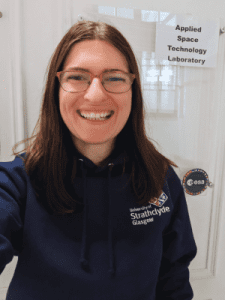
I was nervous about taking this step, since I’ve been out of university for five years and don’t have a master’s degree, but my friends and family all encouraged me and pushed me to believe in myself. If it weren’t for that chat with a friend, I don’t think I’d be here right now! I owe a lot to them and that conversation for giving me the courage to chase my dreams.
Revolutionising the design and operation of space systems, ensuring a sustainable future for space exploration and use
My research is concerned with keeping space sustainable for use in the future. The space industry is evolving from exclusive access by a few countries to widespread participation and data sharing. This shift, part of the NewSpace era, aims to make space more accessible to all. Despite the growing number of spacecraft and the expansion of space-based services, our management methods haven’t kept pace, posing risks to space safety and sustainability.
My project seeks to establish a community-led, decentralised approach to space operations using distributed ledger technology, promoting fair and secure decision-making. This Decentralised Autonomous Community in Space (DACS) will focus on improving the safety and efficiency of spacecraft manoeuvres in space through coordinated movements and machine-to-machine communications. The goal is to revolutionise the design and operation of space systems, ensuring a sustainable future for space exploration and use.
I chose this PhD because I think it will enable me to have a positive, tangible impact on our society and help keep space accessible to all. I am very passionate about ensuring humanity doesn’t lose access to space because of unsustainable actions, and I’m excited about being able to use my skills from working in the technology sector to help do that. Given that I took a different route into academia, it was important to me that a PhD built on the skillset that I’ve spent my entire career growing, but also pushed me towards my ultimate goal of working in the space sector. I’m fortunate that in past roles I have worked on satellite constellation projects, and it will be great to get back into that field but in a new way.
More about distributed ledgers
A distributed ledger can be thought of as a database that keeps records of transactions, similar to how you might see money move in and out of your account on a bank statement. This database is accessible by everyone involved in these transactions, and everyone has an up-to-date copy. Any changes made are reflected for everyone to see simultaneously.
A distributed ledger is similar. It’s a public, digital record of transactions, like a bank statement, but it’s shared and synchronised across a network of computers instead of being held by one person or bank. Each computer has a copy of the ledger, and everyone agrees on what the latest version is. This way, there’s no single point of failure and no need for a central authority to verify everything. No one single person or computer controls the ledger, and everyone is able to see the full history of transactions. The information in the ledger is kept secure using cryptography, which encrypts the data to keep it protected and safe from being tampered with.
Distributed ledgers are most commonly known for their use in cryptocurrencies like Bitcoin, where they keep a record of who owns how much of the currency. However, they also have applications in other areas like satellite communications, where we are trying to get satellites in a network to agree on tasks, like orbital manoeuvres, that have been performed. In this way, we can make satellite launches and movements safer by having an accurate record of when a satellite last changed position.
Multilingual programmer
My primary programming language is Python. I use this most days because it’s quite versatile. I have also used Java, C, MATLAB and Bash scripting for some smaller projects in the past. They are all very different languages, with completely different applications and syntax, so it’s difficult to get them mixed up! That being said, there are some common pitfalls I find myself in with these languages — like forgetting to add a semi-colon at the end of a line of C code and spending hours trying to figure out where I’ve missed it!
Destination: Dr Clarke
My PhD is funded for the next three and a half years, so I’m due to submit my thesis in October 2027. Throughout my PhD, I hope to contribute to some conference and journal papers, develop some simulations of satellite networks sending tasks to each other over a distributed ledger network, and of course write up my thesis which will be used to assess my work at the end of my studies. I should be Dr Clarke by 2027!
How the Womanthology community can engage

Coming up next
2024 has already been an incredibly exciting year for me, and there is plenty more to come! I’ve got a couple of exciting conference talks coming up, including at the International Astronautical Congress in Milan in October, as well as some exciting outreach projects to inspire more people to pursue their passions in science and engineering.

